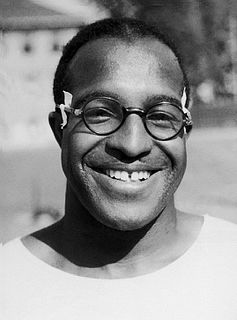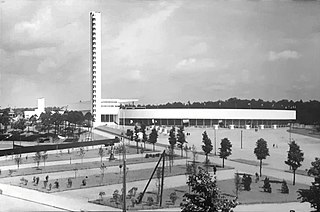The men's 800 metres at the 2004 Summer Olympics as part of the athletics program was held at the Athens Olympic Stadium from August 25 to 28. Seventy-two athletes from 58 nations competed. The event was won by Yuriy Borzakovskiy of Russia, the first medal for the nation in the event. Wilson Kipketer of Denmark became the 10th man to win a second medal in the 800 metres.
The men's 800 metres was the middle of the seven men's track races in the Athletics at the 1964 Summer Olympics program in Tokyo. 47 athletes from 32 nations competed. The maximum number of athletes per nation had been set at 3 since the 1930 Olympic Congress. The first round was held on 14 October, with the semifinals on 15 October and the final on 16 October. The event was won by Peter Snell of New Zealand, successfully defending his 1960 gold medal, and completing the first half of his 800 metres/1500 metres double. Bill Crothers of Canada took silver, the first 800 metres medal for that nation since 1936 and matching Canada's best-ever result in the event. Wilson Kiprugut's bronze was the first medal by Kenya in any event; Kenya would become a frequent fixture on the men's 800 metres podium.

The men's 200 metres sprint event at the 1932 Summer Olympics took place on August 2 and August 3 at the Los Angeles Memorial Coliseum. There were 25 athletes from 13 nations. The 1930 Olympic Congress in Berlin had reduced the limit from 4 athletes per NOC to 3 athletes. After missing the podium entirely in 1928, the United States swept the medals in the event in 1932. It was the second medal sweep in the event by the United States (1904) as well as the nation's sixth victory in eight Games. Eddie Tolan won gold, with George Simpson winning silver and Ralph Metcalfe winning bronze.
The men's 800 metres event at the 1956 Summer Olympics in Melbourne was held on 23, 24, and 26 November 1956. There were a total number of 38 competitors from 24 nations. The maximum number of athletes per nation had been set at 3 since the 1930 Olympic Congress. The event was won by Tom Courtney, the last of a streak of four American victories in the event and the seventh overall United States victory. Derek Johnson's silver put Great Britain back on the podium for the first time since that nation's own four-Games gold streak ended in 1932. Norway received its first men's 800 metres medal with Audun Boysen's bronze.
The men's 100 metres sprint event at the 1956 Olympic Games in Melbourne, Australia, was held at the Melbourne Cricket Ground on 23 and 24 November. Sixty-five athletes from 31 nations competed; each nation was limited to three athletes. The final was won by American Bobby Morrow, marking the fifth consecutive victory by a different American. Hec Hogan of Australia won that country's first medal in the event since 1900. The competition took place in strong winds, with the final run into a 2.5 m/s (5.6 mph) headwind.

The men's 200 metres was an event at the 1928 Summer Olympics in Amsterdam. It was held on 31 July and 1 August 1928 at the Olympic Stadium. There were 59 competitors from 29 nations. Nations had been limited to 4 athletes each since 1920. The event was won by Percy Williams of Canada, the nation's second victory in the event. The win broke a streak of three victories by the United States; with no Americans on the podium, the nation's six-Games medal streak was broken as well. Walter Rangeley of Great Britain took silver, giving Great Britain a four-Games medal streak in the event. Germany earned its first men's 200 metres medal with Helmut Körnig's bronze.
The men's 800 metres event at the 1984 Summer Olympics in Los Angeles, California took place between 3 and 6 August. Sixty-nine athletes from 55 nations competed. The maximum number of athletes per nation had been set at 3 since the 1930 Olympic Congress. The event was won by Joaquim Cruz of Brazil, the nation's first medal in the men's 800 metres. Sebastian Coe of Great Britain repeated his silver-medal performance from 1980, the eighth man to win two medals in the event.
The men's 800 metres at the 2008 Summer Olympics took place from 20–23 August at the Beijing National Stadium. Fifty-eight athletes from 40 nations competed. The qualifying standards were 1:46.00 and 1:47.00. The final on 23 August resulted in a triumph for Kenyan runner Wilfred Bungei in an official time of 1:44.65. It was the first victory in the event for Kenya since 1992 and the third overall. Ismail Ahmed Ismail's silver medal was Sudan's first Olympic medal in any competition.

The men's 200 metres was held on 2 September and 3 September as part of the athletics at the 1960 Summer Olympics, which were held in Rome. 74 athletes from 54 nations entered, but only 62 athletes from 47 nations ultimately competed. The maximum number of athletes per nation had been set at 3 since the 1930 Olympic Congress. The event was won by Livio Berruti of Italy, the first victory in the event by a nation outside of North America and snapping a five-Games winning streak by the United States. The Americans finished with a silver medal, by Lester Carney, to extend their medal streak to six Games. Abdoulaye Seye of France took bronze. Berruti's gold and Seye's bronze were the first medal for their nations in the men's 200 metres.
The men's 100 metres sprint event at the 1976 Olympic Games in Montreal, Quebec, Canada, was held at Olympic Stadium on July 23 and 24. Sixty-three athletes from 40 nations competed. Each nation was limited to 3 athletes per rules in force since the 1930 Olympic Congress. The event was won by Hasely Crawford of Trinidad and Tobago, earning the nation's first gold medal and making Crawford a national hero. Don Quarrie's silver medal made Jamaica only the third country to reach the men's 100 metres podium three consecutive times. Valeriy Borzov of the Soviet Union was unable to defend his title, but by taking bronze became the third man to medal twice in the event. For only the second time, the United States did not have a medalist in the event.
The men's 400 metres was an event at the 1976 Summer Olympics in Montreal. The competition was held on July 26, 1976, July 28, 1976, and on July 29, 1976. Forty-four athletes from 29 nations competed. The maximum number of athletes per nation had been set at 3 since the 1930 Olympic Congress. The event was won by Alberto Juantorena of Cuba, the nation's first medal in the event, breaking a string of five victories by the United States. Juantorena became the first man to win both the 800 metres and 400 metres in an Olympics.

The men's 200 metres sprint event at the 1936 Olympic Games took place between August 4 and August 5. There were 44 athletes from 22 nations competing. The maximum number of athletes per nation had been set at 3 since the 1930 Olympic Congress. The final was won by African American Jesse Owens, with silver going to Mack Robinson. Owens thus reached 3 gold medals in 1936, with the sprint relay still to come. The Netherlands earned its first medal in the men's 200 metres with Tinus Osendarp's bronze.
The men's 400 metres sprint event at the 1936 Olympic Games took place in early August. Forty-two athletes from 25 nations competed. The maximum number of athletes per nation had been set at 3 since the 1930 Olympic Congress. The final was won by American Archie Williams, the third consecutive and seventh overall title in the event for the United States. Godfrey Brown's silver was Great Britain's first medal in the event since 1924.

The men's 200 metres sprint event at the 1948 Summer Olympics took place between 2 August and 3 August. There were 51 competitors from 28 nations. The maximum number of athletes per nation had been set at 3 since the 1930 Olympic Congress. The final was won by American Mel Patton. His countryman Barney Ewell earned silver, making this the third consecutive Games the United States took the top two spots in the event. Lloyd La Beach's bronze gave Panama a medal in its debut in the event.

The men's 400 metres sprint event at the 1948 Olympic Games took place between August 4 and August 5. Fifty-three athletes from 28 nations competed. The maximum number of athletes per nation had been set at 3 since the 1930 Olympic Congress. The final was won by Jamaican Arthur Wint coming from almost 10 meters back to catch teammate and world record holder Herb McKenley. This was Jamaica's first Olympic gold medal in any event, and broke a string of 3 straight American victories in the men's 400 metres.

The men's 200 metres sprint event at the 1952 Olympic Games took place between July 22 and July 23. There were 71 competitors from 35 nations. The maximum number of athletes per nation had been set at 3 since the 1930 Olympic Congress. The final was won by American Andy Stanfield. Americans also took silver and bronze as the United States swept the medals in the event for the third time.
The men's 400 metres sprint event at the 1952 Olympic Games took place between July 24 and July 25. Seventy-one athletes from 35 nations competed. The maximum number of athletes per nation had been set at 3 since the 1930 Olympic Congress. The event was won by George Rhoden of Jamaica, the second consecutive title in the event by a Jamaican. Herb McKenley repeated his silver medal performance from 1948, becoming the second man to win two medals in the event.
The men's 800 metres event at the 1952 Olympics took place between July 20 and July 22. Fifty athletes from 32 nations competed. The maximum number of athletes per nation had been set at 3 since the 1930 Olympic Congress. The final was won by the American Mal Whitfield.

The men's 200 metres was an event at the 1972 Summer Olympics in Munich. The competition was held on 3–4 September. There were 57 competitors from 42 nations. The maximum number of athletes per nation had been set at 3 since the 1930 Olympic Congress. The event was won by Valeriy Borzov of the Soviet Union, the nation's first medal in the event. Larry Black took silver, extending the United States' podium streak in the men's 200 metres to nine Games. Italy earned its first medal in the event since 1960 with Pietro Mennea's bronze.
The men's 400 metres was an event at the 1972 Summer Olympics in Munich. The competition was held on 3, 4 and 7 September. Sixty-four athletes from 49 nations competed. The maximum number of athletes per nation had been set at 3 since the 1930 Olympic Congress. The event was won by Vince Matthews of the United States, the nation's fifth consecutive and 12th overall victory in the event. The Americans' hopes to repeat their podium sweep of four years earlier were dashed by injury in the final. Bronze medalist Julius Sang became the first black African to win a sprint Olympic medal, earning Kenya's first medal in the event.







